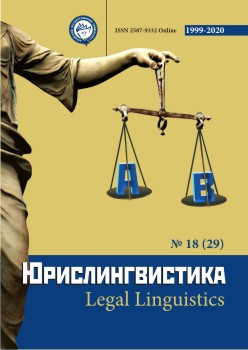On the Problems of Using Term «Fitness» in the Legislation of the Russian Federation
Abstract
The article centers on the study of new concepts in the legislation of the Russian Federation on physical training and sports. The authors analyze the concept of «fitness center», whichhas appeared in the legislation quite recently. There have arisen doubts about the rationale for its use among the variety of many similar terms that are actuallyemployed, which creates difficulties in determining their correlation. It has been noted that the term «fitness» has no conventional meaning and is not traditional for Russian reality. Another option is proposed to regulate the operation of physical training and sports organizations, the purpose of which is to provide citizens with services of physical training and physical development. In the approach proposed by the authors, the text of the law should contain a general term to unify names of such organizations. Under this approach, the term «fitness center» is unnecessary. The authors have not found any reasons for introducing the term «fitness» into the text of the Russian law, although they do not exclude their appearance in the future. Many practical problems have been noted that arise due to the lack of high-quality legal regulation of the activities of organizations that provide citizens with physical training and physical developmentservices. The authors come to the conclusion that the main problem is not the name of such organizations, but the contents of the regulation of their activities. The necessity of legislative clarification of such terms as «crossfit», «aqua fitness», «fitness aerobics», «body fitness», «fitbox» and some others is analyzed. The authors note that their indtoduction intothe text of a normative legal act is possible in order to set the rules for a particular sport or instructions for coaches, orin other similar documents. Simple placing of terms and their definitions in the text of the law is perceived as inappropriate.
Downloads
Metrics
References
Сайкина Е.Г., Пономарев Г.Н. Семантические аспекты отдельных понятий в области фитнеса / Теория и практика физической культуры. – 2011. – № 8. – С. 6-10.
Сайкина Е.Г. Фитнес в системе физической культуры / Известия Российского государственного педагогического университета им. А.И. Герцена. – 2008. – № 68. – С.182-189.
Пирог Д.Ю. Перспективы правового регулирования фитнеса в Российской Федерации / Законы России: опыт, анализ, практика. – 2018. – № 9. – С. 92-96.
Шевченко О.А. О взаимодействии трудового законодательства и норм саморегулирования спортивных организаций / Законы России: опыт, анализ, практика. – 2014. – № 9. – С. 9-15.
Бычков А. Фитнес-клуб: анализируем правовые аспекты деятельности / Новая бухгалтерия. – 2017. – № 2. – С. 128-144.
Лагвилава Т.И. Проблематика введения в законодательство Российской Федерации в области физической культуры и спорта понятия "фитнес" / Юстиция. – 2019. – № 1. С. 7-11.
References
Saykina, E.G., Ponomarev G.N. (2011).Semantic aspects of certain concepts in the field of fitness.Theory and practice of physical culture, 8, 6-10 (in Russian).
Saykina, E.G. (2008).Fitness in the system of physical culture.Bulletin of the A.I. HerzenRussian State Pedagogical University, 68, 182-189 (in Russian).
Pirog,D.Yu.(2018). Prospects for the legal regulation of fitness in the Russian Federation. Laws of Russia: experience, analysis, practice, 9, 92-96 (in Russian).
Shevchenko, O.A. (2014). On the interaction of labor legislation and self-regulation norms of sports organizations. Laws of Russia: experience, analysis, practice, 9, 9-15 (in Russian).
Bychkov, A. (2017). Fitness club: we analyze the legal aspects of the activity.New accounting, 2, 128-144 (in Russian).
Lagvilava, T.I. (2019). Problems of introducing the concept of "fitness" into the legislation of the Russian Federation in the field of physical culture and sports.Justice, 1, 7-11 (inRussian).
Copyright (c) 2020 Екатерина Коваленко, Надежда Тыдыкова

This work is licensed under a Creative Commons Attribution 4.0 International License.
The authors, which are published in this journal, agree to the following conditions:
1. Authors retain the copyright to the work and transfer to the journal the right of the first publication along with the work, at the same time licensing it under the terms of the Creative Commons Attribution License, which allows others to distribute this work with the obligatory indication of the authorship of this work and a link to the original publication in this journal .
2. The authors retain the right to enter into separate, additional contractual agreements for the non-exclusive distribution of the version of the work published by this journal (for example, to place it in the university depository or to publish it in a book), with reference to the original publication in this journal.
3. Authors are allowed to post their work on the Internet (for example, in a university repository or on their personal website) before and during the review process of this journal, as this may lead to a productive discussion, as well as more links to this published work (See The Effect of Open Access).











